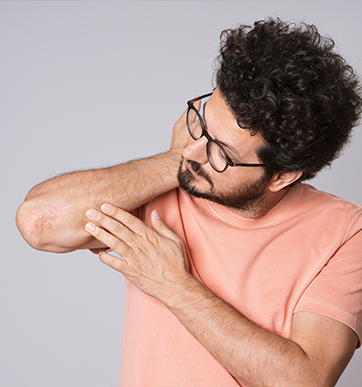
Psoriasis or Something Else? Here’s How to Tell
Edited by Radhika Shah PharmD, MD
Are you being rash about self-diagnosing a rash? Psoriasis Awareness Month is here, and your board-certified dermatologists at California Skin Institute are here for you!
What is Psoriasis?
Psoriasis is an immune-mediated disease. That means part of the body’s immune system becomes overactive and can disrupt normal body functions. Although psoriasis is not contagious, it is a fairly common condition, with approximately 7.5 million men, women, and children in the US affected.
How Does Psoriasis Work?
Psoriasis happens when your immune system switches your skin cell turnover cycle to fast forward. Typically, new skin cells form and shed in a month. With psoriasis, skin cells turn over in only three or four days. Instead of shedding however, the skin cells pile up and cause a kind of skin cell traffic jam on the surface of your skin. This results in red plaques topped with silvery gray scale. —. Although they mostly appear on knees, elbows and scalp, psoriasis can appear on any part of the body including the underarms and genitals. While psoriasis is most commonly associated with the skin, it can also be associated with arthritis and increased cardiovascular mortality. Early intervention guided by your dermatologist will help to prevent potential adverse events.
Psoriasis vs. Eczema
Even though psoriasis and eczema are both itchy, psoriasis also stings, almost like a bite from an insect. That’s a key difference. Both may appear similar, but skin inflamed by psoriasis can appear redder and thicker than skin inflamed by eczema. It may take a trained board-certified dermatologist’s eye or biopsy to tell the difference.
Eczema is more likely to be triggered by contact reactions to entities such as detergent or pollen, while psoriasis flare-ups can result from illnesses such as strep throat,secondary to a skin injury, or transient life stressors. Many patients with both eczema and psoriasis experience depression.
Psoriasis vs. Seborrheic Dermatitis
Another contender among psoriasis-lookalike conditions is seborrheic dermatitis. A key difference is oil — sebum to be exact, the oily substance produced by your skin to protect it. But when too much sebum gets produced, a yeast that lives on the skin known as Malassezia becomes overactive. This results in the characteristic skin findings associated with seborrheic dermatitis .
Seborrheic dermatitis occurs in locations where there is increased sebum secretion such as the face and scalp, but also can affect the chest and back. Seborrheic dermatitis looks like dry, yellowish, flaky skin but feels greasy to the touch.
Psoriasis, in contrast, will be dry and silvery. Both conditions can itch, but only psoriasis will sting.
There is also a condition called sebopsoriasis where seborrheic dermatitis and psoriasis overlap. In that case, you will likely have the symptoms of both.
Psoriasis vs. Ringworm
Ringworm, or tinea corporis, is another condition that may somewhat resemble psoriasis. Lots of little red bumps that itch? Yes, for both diseases. Both psoriasis and ringworm can emerge in similar areas of the body, including the groin. But the similarities may end there. Psoriasis, as we’ve explored above, is an immune-mediated disease, perhaps hereditary. Ringworm is a fungal infection.
Ringworm is also highly contagious, unlike psoriasis. It can be acquired from direct contact with another person, an animal or a contaminated object. The fungi that causes this infection can live on skin and all kinds of surfaces, including household items like clothing, towels and bedding.
A telltale sign that it’s ringworm and not psoriasis is the raised itchy bumps form a circle with central clearing and minimal scale that looks like a coiled worm. Hence the name.
Psoriasis vs. Skin Cancer
A scaly growth that bleeds or develops a crust could be skin cancer, particularly squamous cell carcinoma. In most cases, skin cancer will be a solitary lesion that continues to grow over a few months and can be painful and sometimes itchy. Skin cancer is often curable if caught and treated early. Here again, the most prudent course of action is a medical diagnosis and subsequent appropriate treatment by a board-certified dermatologist.
Psoriatic Arthritis
Inflammation caused by psoriasis not only affects the skin but can also affect other organs and tissues in the body and trigger other health conditions. One example of this is psoriatic arthritis, caused by inflammation of the ligaments and tendons attached to the bones. Like osteoarthritis, this can cause swelling, stiffness and pain in the joints and areas around the joints, however symptoms are worst first thing in the morning and improve as the day goes on. Early intervention is extremely important with psoriatic arthritis to help avoid permanent joint damage.
Psoriasis and heart health
Recent studies have also shown that in addition to affecting the skin and joints, inflammation with psoriasis is associated with an increased risk of cardiovascular disease. Risk factors include having diabetes, obesity, high blood pressure, and high cholesterol levels. Studies have shown that patients have a 50% higher risk of developing cardiovascular disease than patients without psoriasis. Patient who have severe psoriasis have a 60% higher risk of developing a stroke and 3x higher risk of having a heart attack.
The Takeaway
Besides those highlighted here, there are other conditions that may be confused with psoriasis (don’t look like psoriasis). Here’s the takeaway: An inflamed patch that is also bumpy, scaly, itchy and maybe painful is not business as usual for your skin. Psoriasis management requires more intensive treatment than some other skin conditions that have a similar appearance. Even if it turns out to not be psoriasis, whatever it may be needs diagnosis and treatment, too. It’s also worth noting that your medical insurance will likely cover costs involved in diagnosing and treating it. Contact California Skin Institute to request an appointment with a board-certified dermatologist near you.



 / 291 Reviews
/ 291 Reviews